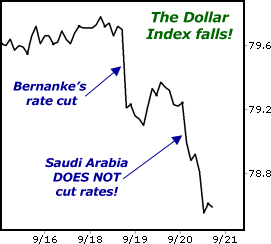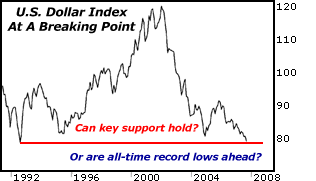Bernanke and the Saudis Punish the US Dollar!
Currencies / US Dollar Sep 21, 2007 - 07:38 AM GMT Jack Crooks writes: With the dollar barely above an all-time low against a basket of the world's major currencies, two major events have now burst onto the scene, slamming it even further:
Jack Crooks writes: With the dollar barely above an all-time low against a basket of the world's major currencies, two major events have now burst onto the scene, slamming it even further:
First, Ben Bernanke and his friends at the Federal Reserve decided to give the stock markets a generous gift, but in the process, have also decided to abandon any vestige of support for the U.S. dollar.
Second, Saudi Arabia has just decided NOT to follow Bernanke's lead, a first step toward unpegging the Saudi currency from the dollar and unleashing a massive new wave of dollar selling from the Middle East.
Here's the scoop on each …
Bernanke Boosts Market's Morale Despite Moral Hazard

As the credit crunch began to panic investors, and as Tuesday's Federal Reserve decision day approached, the entire issue of moral hazard came to the fore.
In this context, moral hazard is simply this: When investors are granted too much protection against losses, they are actually encouraged to continue their reckless behavior.
And now, the fear is that the Fed's rate cut amounts to a bailout for all those who took on too much risk via subprime loans and other credit maneuvers.
The consequences? Potentially disastrous:
Consequence #1: The risk that inflation will take hold.
Even ex-Fed Chairman Alan Greenspan said dramatic easing of monetary policy may open the door for surging inflation.
And by many measures, inflation isn't even tame right now: Crude oil set record highs this week. Gold and other commodities are shooting the lights out. Food prices are zooming higher.
Consequence #2: Treasury bond prices are plunging.
Because investors — in the U.S. and overseas — are worried that rate cuts will fan the flames of inflation, they demand higher interest rates on their longer-term investments. So prices plunge.
Result: Just in the last two trading days, the price of the long bond is down nearly 3 full points. Yesterday's drop alone was the worst since September of 2003.
Biggest Consequence of All: More punishment for the already suffering dollar.
The picture is clear and simple: Investors are dumping the U.S. dollar. Heavy selling commenced immediately after the Fed announcement and has continued virtually nonstop ever since.

Remember: Interest rates are a huge factor in how a nation's currency trades. That's because investors seek out currencies that pay attractive rates of return. When a country's rates are going down, investors sell and move on to greener, higher-yielding pastures.
Bottom line: The recent Fed decision, and the potential for more rate cuts in the future, has undermined the greenback yet again .
To make matters worse …
Saudi Arabia Just Says "No" To the Fed's Rate Cut
Saudi Arabia's currency, the riyal, has been pegged to the dollar since 1986. In other words, the two should trade in tandem based on a fixed exchange rate (3.75 riyals for every dollar).
And as I explained a moment ago, interest rates affect currencies. Thus, when a currency is pegged to another, the two countries involved need to follow parallel interest rate policies.
That's why yesterday's news — that Saudia Arabia decided not to cut its interest rates — was a shock. Apparently, the Saudis are worried that enacting rate cuts would just bring more inflation into their economy.
Now, many market watchers are worried that the country is considering breaking the dollar currency peg altogether. What would that mean? It means that …
#1. The Saudis could start selling their massive stash of dollar reserves.
If they were to abandon the dollar peg, the Saudis would no longer need so many greenbacks. They would have every incentive to reduce their dollar holdings to avoid losses. And they would have every reason to trade those dollars for other currencies such as euros and pounds.
#2. Other oil-rich nations might follow suit.
Saudi Arabia is the big man on campus in the Gulf. And historically, it's been a strong U.S. ally. If it decided it no longer needed the dollar, many other oil-producing nations might reach the same conclusion. In fact, Kuwait already broke its dollar peg in May. And the United Arab Emirates could break off its dollar peg in the near future.
#3. The Saudis might even decide to price their oil in another currency!
Presently, all oil transactions occur in dollars (Iran is the lone exception). This means countries around the globe that purchase oil are forced to hold dollars to pay for it. Should this change, there would be no reason for those countries to hold dollar reserves to pay for oil.
Already, just yesterday, the price of crude oil surged to $84 per barrel — another symptom and consequence of this looming disaster for the dollar.
In each of these situations, the end result would be wholesale selling of the dollar, driving the greenback's value into a further tailspin.
Do I think the Saudis will stop pricing oil in dollars immediately? No. They still rely on the U.S. defense shield. But even the concern that these events could unfold is enough to cause the dollar's value to fall further as worried investors sell their greenbacks.
These Recent Developments Will Shake Up Other Major Currencies, Too …
The falling dollar is not a new story, but it's an ongoing one. And its impact will be felt around the world. In fact, the Fed's decision to lower rates — and create a fresh wave of credit — has affected the currency market quite dramatically.
Want proof? Look at the so-called commodity dollars (ComDols), or those currencies tied to major natural resource-based economies. Australia, Canada, and New Zealand all saw their dollars move up against the greenback.
The fact that growth and monetary policy in these commodity-focused economies remains firm (mainly because of the rising prices I mentioned earlier), makes the ComDols look like very appealing currency plays over the next few weeks.
What about Europe's currencies? Well, the euro has been playing the role of dollar alternative, rising to record highs over the course of the week. The British pound hasn't fared so well because the Bank of England looks like it's facing many of the same lending problems that we have here in the U.S.
And among all the major currencies, the Japanese yen has the greatest potential of all: Not only because of the powerful forces punishing the dollar, but also because of the equally powerful forces I've told you about that are likely to drive the yen through the roof!
Best wishes,
by Jack Crooks
This investment news is brought to you by Money and Markets . Money and Markets is a free daily investment newsletter from Martin D. Weiss and Weiss Research analysts offering the latest investing news and financial insights for the stock market, including tips and advice on investing in gold, energy and oil. Dr. Weiss is a leader in the fields of investing, interest rates, financial safety and economic forecasting. To view archives or subscribe, visit http://www.moneyandmarkets.com .
Money and Markets Archive |
© 2005-2022 http://www.MarketOracle.co.uk - The Market Oracle is a FREE Daily Financial Markets Analysis & Forecasting online publication.



